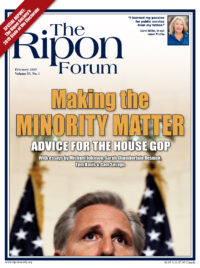
The 2018 midterm losses for Republicans in the House of Representatives were the largest since the Watergate election in 1974, when they lost 49 seats.
Many Republicans were surprised at the extent of these losses, but many of these results were in line with historical metrics. For example, in the prior three mid-term elections where one party controlled the House, Senate and White House, the majority party lost seats each time.
In 1994, when Bill Clinton was President and Democrats controlled both chambers of Congress, Democrats lost 54 seats in the House. Likewise, in 2006, when George W. Bush was President and his party controlled both chambers, Republicans lost 30 seats. And in 2010, when Barack Obama was President and his party was in charge of things on Capitol Hill, Democrats lost 63 seats in the House.
The fact that Republicans had substantially over-performed in the prior election years of 2014 and 2016 increased the likelihood that the party would bleed some seats in a correction year like 2018. However, operating against the historical grain were several key factors. For instance, the economy’s performance was well above mid-term averages and should have benefitted the incumbent party. The GOP was also greatly advantaged by the way districts were drawn either through residential sorting patterns, which sees Democrats live in tightly clustered cities, or through the Voting Rights Act, which not only resulted in minorities being packed into safe Democratic enclaves, but allowed Republicans to prevail in the districts around them where the minority populations were vastly reduced. Along those same lines, gerrymandering also benefitted Republicans because they drew the vast majority of Congressional district maps.
Perhaps the least discussed, but probably the most important change, in the 2018 election dynamics was the huge Democratic spending advantage in Congressional races.
There were other key factors, as well. President Trump’s radioactivity with suburban educated women and minority groups shifted suburban districts away from the GOP, as voters sought to put a check on the President rather than giving him a blank check. Moreover, enthusiasm among the Democratic base voters tilted the turnout model against Republicans in any district with a degree of housing density.
ActBlue & the Green Wave
Perhaps the least discussed, but probably the most important change, in the 2018 election dynamics was the huge Democratic spending advantage in Congressional races. From Super PACs to small donors to direct PAC contributions to candidates, the Democrats raised 30% more money than their GOP counterparts. Seasoned Republican incumbents with strong committee assignments were outraised by little known Democrats in both competitive and non-competitive districts across the country.
The intensity of hostility against the Trump presidency drove not just billionaires, but also millennials, students, and housewives to open their wallets with the aid of ActBlue, a little-known bundling operation out of Somerville, MA that allocated many campaign dollars to little-known Democratic challengers across the country by election day. This allowed mediocre, unknown, and often disconnected candidates to run professional campaigns and turn formerly safe Republican seats into competitive races.
Republican leaders have now coalesced in an attempt to replicate ActBlue’s performance, which accumulated more hard money than was raised, in total, by the DCCC. The new entity is called the “Patriot Pass” platform, and will be up and running for the 2020 campaign cycle.
From Super PACs to small donors to direct PAC contributions to candidates, the Democrats raised 30% more money than their GOP counterparts.
While establishing the “Patriot Pass” is a good and much needed step, it is important to keep in mind two key points about ActBlue and the challenges of matching the performance of Democrats in this regard.
First, ActBlue has been up and running for over a decade. Its branding has been a 14-year proposition, and it is a well-known and easy conduit for relatively uninformed, but passionate Democrats to contribute to the cause. It claims to have raised over $3.1 billion dollars since its inception, and has allowed Democrats who live in safe Democratic enclaves to make an impact in competitive and Republican areas elsewhere.
It will take years for the Republicans to reach the same level of penetration. Ask yourself –does the name Patriot Pass convey the same sense of urgency and partisanship as ActBlue? Beyond the semantics, the simple fact of the matter is that it will take years to develop the lists and level of familiarity that ActBlue currently enjoys. Nevertheless, the Patriot Pass platform is an important start and a tribute to the various vendors and cliques that came together for this important creation.
Looking Ahead
Still, it will be extremely difficult to match the intensity that ActBlue’s contributors demonstrated in 2018.
Democratic intensity was palpable in every special election, in the Virginia legislative elections, and in the number of Democratic candidates running leading up to the 2018 midterms. There is a reason the party of the sitting President has lost seats in the House in 36 of the last 39 mid-term elections. That is because anger drives turnout, and the “out” party is generally more motivated.
In the case of President Trump, anger at the out party and a desire for change drove his 2016 upset victory. But instead of consolidating and expanding his base, as a minority President, he doubled down. This had the effect of throwing gasoline on the fire for his opponents, who were still smoldering from his 2016 victory.
The Patriot Pass is an idea that is long overdue. But Republicans have much catching up to do, and a mechanism to bundle contributions does not produce unless there is a passionate constituency to fuel it.
With 2020 being a Presidential election year, voters’ interests will tend to gravitate toward the Presidential race, which is the focus of the media circus and where the big dollars go. That dynamic will give Congressional Republicans somewhat of a reprieve from the dollar onslaught they suffered in the 2018 midterm elections.
However, they should also remember that the largest fundraiser for Republicans is Donald Trump, and he is liable to soak up the lions’ share of small contributions for his own reelection, not the reelection of Congressional Republicans.
Make no mistake – the Patriot Pass is an idea that is long overdue. But Republicans have much catching up to do, and a mechanism to bundle contributions does not produce unless there is a passionate constituency to fuel it. It took ActBlue 14 years to produce its record results in 2018. Republicans are woefully behind and should not expect to catch up in one election cycle.
But Patriot Pass is a much needed jump start for the GOP if it is to level the financial playing field and gain back the House majority.
Tom Davis represented the 11th District of Virginia in the U.S. House of Representatives from 1995 to 2008. For four of those years, from 1999 to 2002, he served as Chairman of the National Republican Congressional Committee. He is currently a partner at Holland & Knight.




